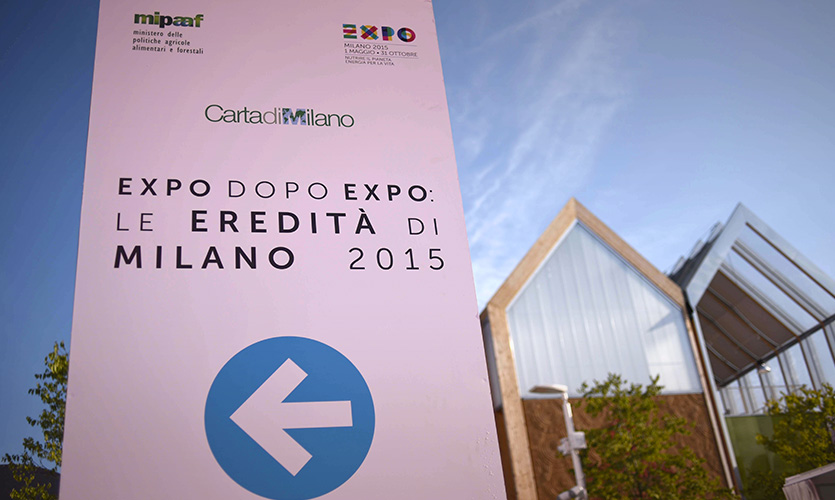
This morning at 10, the work session began for “Expo after Expo. The legacy of Expo 2015,” the last part of a series that began on February 7 at the Hangar Bicocca with “Ideas from Expo on the Milan Charter” which led to the drafting of the Milan Charter, a collective document on the right to food that will be submitted to UN Secretary-General Ban Ki-Moonon October 16, during World Food Day. The goal of today’s meeting was to secure the legacy of Expo Milano 2015. The day is organized into a work session with tables on 26 subjects, followed by a plenary session at 12:30.
Today’s meeting, moderated by Roberto Arditti, opened with a greeting from philosopher Salvatore Veca, Ambassador to Expo Milano 2015 and curator of the Expo Workshop, a scientific administration project of Expo 2015 and theGiangiacomo Feltrinelli Foundation.
“This work day marks the start of an identification and definition process for fundamental terms and the distinctive features of the legacy of Expo Milano 2015,” explained Veca. “The subject tables will work to define the most relevant, high-priority subjects. As a whole, the reports from the tables will make up the basic contribution to outline a coherent context for the proposed projects. There are at least three kinds of projects: centered on knowledge, centered on practical know-how, centered on actions – science, technology, education, practices – in the various fields related to the great subject that we are inheriting.”
The contents of the first plenary session
The morning plenary session was full of content and ideas. In the first place, Matteo Vignoli, researcher at the University of Modena and Reggio Emilia presented a map of the content involved with the subjects of Expo Milano 2015, created by content aggregator Wiki Expo, a project of the Italian library with the Future Food Institute of Bologna (FFI) and theInstitute for the Future of Palo Alto (California).
“This map tells of the power of the content created in Expo Milano 2015 in recent months,” commented Maurizio Martina, Minister of Agricultural, Food and Forest Policies, “more than 7,000 meetings of merit where we confronted the great subjects. I think that this work, together with what was done on February 7, is important since we have drawn positive attention from everybody. The Milan Charter has been fundamental to getting so many visitors and participants to sign it.”
Monica Maggioni, President of RAI, also participated. “Expo Milano 2015 has been a great commitment and a path traveled together, often with discoveries at stop after stop. What has this taught us? We succeeded in doing something that many said would fail. The country has shown itself to the whole world and proven to be trustworthy in the eyes of all. Television and RAI have been able to interconnect the public services.”
Cantone: Expo Milano 2015 is a model that should become common
Another leader of the morning session was Raffaele Cantone, President of the National Anti-Corruption Authority. “Expo Milano 2015 has become a model,” the magistrate began. “It is a demonstration that it is not true that inspections make work take longer; rather, it often allowed the work to resume in safety. To have a great success for an event that is put on based on the rules is, I believe, a great thing for our country. Expo Milano 2015 has been a positive model for contracting systems. Now we need to look over the contracting codes in order to make this extraordinary model into something ordinary. Expo Milano 2015 was a fundamental moment in my career. The positives outweigh the negatives.”
Pisapia and Fassino: from Milan, an event that involved all of Italy
Giuliano Pisapia, Mayor of Milan, and Piero Fassino, President of the Association of Italian Cities, took the stage to represent the Italian cities most involved in Expo Milano 2015. Giuliano Pisapia recalled that Milan became a leader in a food policy project that will bring together 100 Italian cities for 400 million citizens and that has among its goals the elimination of food waste.
Piero Fassino, on the other hand, reminded participants of the importance of involving 500 cities to show off Expo Milano 2015 and the food specialties of every region of Italy.
An appointment for COP 21 in Paris
The speech by Gian Luca Galletti, Minister of the Environment, laid down a bridge to COP 21, which will be held in late 2015 in Paris. “Italy represents barely 1% of global carbon dioxide emissions,” explained Galletti, “but because of our environmental sensitivity, we must do our part to help obtain an international accord this time, unlike the Kyoto Protocol, which was not signed by the United States and China.”
Meteorologist Luca Mercalli spoke on the importance of finding an accord to stop global temperatures from rising more than 2° C, explaining the dangers that melting glaciers pose for agricultural production.
The conclusions of the Italian production system and civil society
Some mini-roundtables followed. The first one enjoyed participation by luminaries of Italian specialties: Pina Amarelli,owner of the company of the same name, historic producer of Calabrese licorice, Paolo Fulci, President of Ferrero,Ettore Riello, President of Verona Fiere and Luigi Scordamaglia, President of Federalimentare.
The second roundtable featured Labor Minister Giuliano Poletti, Sergio Silvotti, President of the Triulza Foundationand representatives of Civil Society associations like Rafaela Milano, Director of Italy-Europe programs with Save The Children, Giacomo Guerrera, President of UNICEF, and Luciano Gualzetti, Deputy Director of Caritas Ambrosiana.

